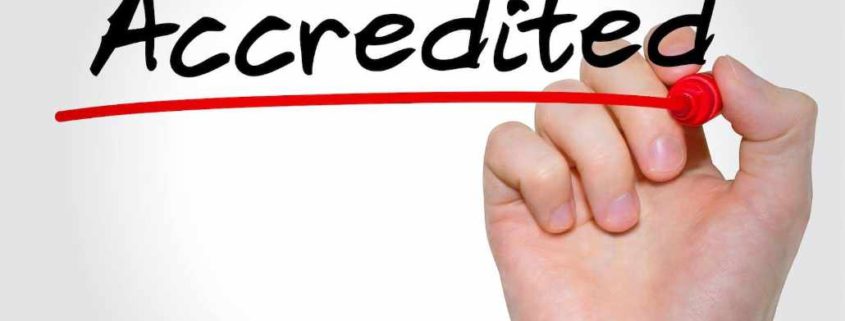Benefits of Accreditation in Healthcare
Table of Contents
What are the benefits of accreditation in healthcare? To understand this, it helps to think of accreditation as a stamp of approval. Not only approval from the agency that is doing the accrediting, but also from your patients and colleagues in healthcare.
When a behavioral healthcare practice seeks accreditation they send the message that they care about reaching the highest industry standards. By making this effort, the practice or center benefits in many ways. Read on to learn about the benefits of accreditation in healthcare.
What is Accreditation?
During the process of launching a healthcare practice or center, one important step to take is to obtain accreditation. Through an independent agency, you’ll take steps to determine if the healthcare or rehab program is meeting industry standards. Once the healthcare provider shows they are adhering to standards, they receive this stamp of approval.
What Are the Prominent Accreditation Agencies in Behavioral Healthcare?
There are two main accrediting agencies for rehab and behavioral health programs. These are the Joint Commission and CARF. The purpose of these agencies is to provide assurance to clients that the rehab adheres to industry standards. The standards set by Joint Commission or CARF reflect best practices in the industry.
- Joint Commission. The Joint Commission is a non-profit agency that certifies healthcare programs. Joint Commission accreditation is central to the success of the center because it ensures it offers a quality product. Joint Commission standards gathered input from health care professionals, consumers, government agencies, and experts in the field to develop these standards.
- CARF. CARF is a non-profit group that created a set of standards for behavioral healthcare providers to adhere to. CARF accreditation ensures that patients receive quality treatment and the best outcomes as a result of following these standards.
Why Should Your Healthcare Practice Be Accredited?
In recent years, insurance companies have driven most healthcare providers toward accreditation. The idea is that if healthcare centers follow specific industry standards, it safeguards the insurers’ financial interests.
As a result, facilities are not as likely to obtain insurance coverage unless they have met the minimum standards. And it isn’t only insurance companies that now expect a treatment center to be accredited. Prospective clients now expect rehabs to be fully licensed and accredited.
5 Benefits Of Accreditation for Your Behavioral Healthcare Center
There are many ways that being accredited will benefit the healthcare practice. Here are a few to consider:
- Patient satisfaction. When consumers seek healthcare, they look for signs that the treatment center is well run and safe. Patients that feel they have received quality treatment within a safe setting are more satisfied.
- Quality Assurance. Accredited healthcare centers ensure that excellence is central to their mission. These rehabs set up the systems needed to ensure that they operate at the highest level.
- Risk Mitigation. Because the rehab center is accredited, it is always aware of the tenets it is based on and the renewal process ahead. This keeps leadership in the mode of managing and insuring ongoing adherence, which results in fewer risks and litigation costs.
- Organizational Health. The rehab’s organizational health as a whole also benefits from accreditation, as these centers will attract higher quality talent. As a provider adhering to the highest standards, it is able to retain this talent.
- Accountability. When a treatment center is accredited they are held to a certain level of accountability to adhere to that certification. This helps build confidence and trust in the program, knowing it must conform to the set standards. When it slips, there are protocols in place to address the need to improve the problem.
How To Get Accredited
There are no limits on who can apply for accreditation, as this is open to any and all healthcare providers. When you decide to begin the process, this is what to expect:
- Become informed first. Learn about the various surveys and materials used in the accreditation process. Both Joint Commission and CARF provide these at no cost on their websites. Being informed helps you prepare for the process, which helps it proceed smoothly.
- Review the requirements. By reviewing the standards by which your center will be rated helps you make changes prior to the accreditation process. You can identify which areas need focus and make those improvements, increasing the chances of being certified.
- Submit the application. Once your practice is ready to begin the application process, you will first set up an account with the agency. You can set a date that you believe you will be ready to start the application. Be aware that once the application is submitted, it could take several months to receive certification.
- Prepare for the on-site survey. Part of the application process involves an on-site survey. Representatives from the agency visit your center to assess the healthcare standards focus areas. Check the websites for materials that will prepare you for this visit.
- Make needed improvements. After the on-site survey, the findings will be made known to you. This provides a chance to resolve any issues within the time period provided.
Consider Getting Some Support For Accreditation
The road to accreditation is sometimes complex and often very time consuming. There are consultants who are ready to help you navigate the process, taking the load off your shoulders. These experts are knowledgeable in the process and can help your rehab avoid any stumbling blocks that could cause delays.
The many benefits of accreditation in healthcare far exceed the hassle of obtaining it. If you would rather focus your time and energy on operational issues or program development, there is help available. Consider reaching out to a consultancy that can handle the accreditation process for you.
Circa Behavioral Healthcare Solutions Consultancy
Circa Behavioral Healthcare Solutions provides organizational consulting for addiction and mental health treatment centers. For more information, contact us today at (888) 458-6619.




